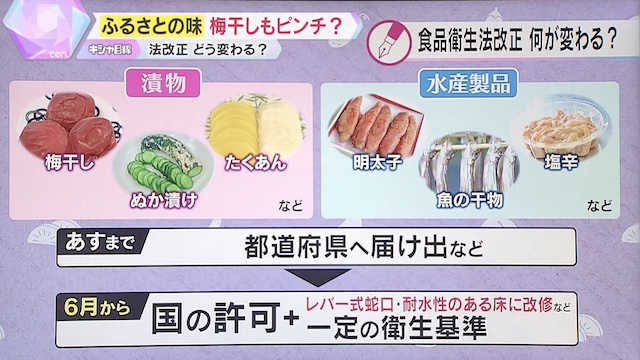Wakayama, May 31 (News On Japan) - The cherished staples of Japanese dining tables, such as umeboshi, dried fish, kimchi, and mentaiko, are now facing a crisis. The issue stems from the Food Sanitation Law, which was revised six years ago. The catalyst for this change was a food poisoning outbreak in 2012, linked to lightly pickled Chinese cabbage, which resulted in the deaths of eight people in Sapporo and other cities.

In response to this incident, stricter hygiene standards for manufacturing were implemented, requiring farmers to meet specified equipment standards. However, the grace period for compliance ends tomorrow, May 31.
These traditional flavors have been passed down through generations. How can Japan balance preserving its food culture while ensuring safety?
These traditional flavors have been passed down through generations. At Wakayama Prefecture's Aridagawa Town Roadside Station, handmade umeboshi from local farmers have been beloved for over 20 years. These products are not just popular with locals but also sought after by visitors who come specifically to purchase them.
However, the new regulations are posing a significant challenge to the continuation of these traditional practices. The Food Sanitation Law revision now requires farmers to upgrade their facilities to meet new hygiene standards, including lever-operated faucets and waterproof floors, to obtain approval from health authorities. This has placed a heavy financial burden on many producers, especially older farmers who have been making umeboshi at home for decades.
In Wakayama Prefecture, where umeboshi production is renowned worldwide, many farmers are struggling to afford the necessary upgrades. Shimizu, a farmer who has been making umeboshi for over 30 years, expressed concerns about the impact of these regulations on his ability to continue his business. He fears that without the required investments, he may not be able to sell his products anymore.
Despite these challenges, efforts are being made to preserve traditional flavors. For instance, some producers have successfully raised funds through crowdfunding to upgrade their facilities and comply with the new regulations. In Aichi Prefecture, over 1 million yen was collected to support umeboshi producers, helping them to meet the new standards.
As Japan strives to balance food safety with preserving its culinary heritage, the need for supportive measures and subsidies becomes evident. Traditional foods like umeboshi and iburigakko (smoked daikon radish) are not only cultural treasures but also recognized by UNESCO as part of the world’s intangible cultural heritage. Therefore, it is crucial to find ways to support these industries and ensure that these traditional flavors can continue to be enjoyed by future generations.
Source: YOMIURI















